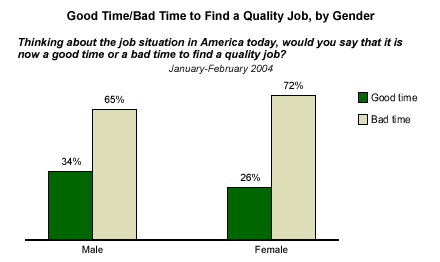The U.S. Bureau of Labor Statistics reports that the 2003 annual unemployment rate of 6.0% is the trend's highest point since it reached 6.1% in 1994. Unemployment reached a post-Vietnam War low of 4.0% in 2000, meaning that the rate has risen by 50% in the last three years.
Given such a dramatic turn of the tables, it's no surprise that Americans continue to be pessimistic about job prospects. According to aggregated results from two polls conducted in January and February*, 69% of Americans think now is a bad time to find a quality job, while less than half that number (30%) think it is a good time for job hunting.
The outlook on job prospects varies somewhat by gender, with women more pessimistic than men are. Only about a quarter of women (26%) feel that now is a good time to find a quality job, while more than a third (34%) of men think so.

Why are women more pessimistic about the job situation than men are? One hypothesis might be that overall, women are less content with the quality of their current jobs than men are. However, some survey data indicate that may not be a significant factor: Gallup's annual Work and Education poll**, last conducted in August 2003, found that there is no significant difference between working men and women in terms of personal job satisfaction.
Another possible explanation for the difference may be the fact that women tend to have lower incomes than men do. Gallup data show that Americans with annual household incomes over $50,000 are significantly more inclined to say that now is a good time to find a job than are those with incomes below $30,000. But even when controlling for income, gender is a significant differentiator.
That brings us back to square one. Perhaps the finding has more to do with subjective factors, such as people's confidence in their own abilities to find a quality job. For example, a 2000 study conducted by Dr. Paul Maciejewski and his colleagues at Yale University found lower levels of self-efficacy (belief in one's own ability to be effective) in women than in men. If women are less confident than men are in their own abilities to navigate stormy economic conditions, this pessimism could lead to a more negative overall outlook on the job market.
Bottom Line
The gender gap in perceptions of the job market is undoubtedly a combination of such factors. The more significant finding is that male or female, most Americans do not think this is a good time to be looking for a quality job.
The good news is that sentiment among both men and women has been improving somewhat in recent months. According to Gallup Polls conducted between December 2002 and September 2003, the proportion of Americans saying it is a good time to find a quality job ranged from 16% to 23%. Between December 2003 and February 2004, that range climbed to between 28% and 31%.
*Results are based on telephone interviews with 1,004 national adults, aged 18 and older, conducted Jan. 12-15, 2004, and 1,002 interviews with national adults conducted Feb. 9-12, 2004, including 997 men and 1,009 women. For results based on the sample of men or women, one can say with 95% confidence that the margin of sampling error is ±3 percentage points. For results based on total sample, one can say with 95% confidence that the margin of sampling error is ±2 percentage points.
**Results are based on telephone interviews with 1,003 national adults, aged 18 and older, conducted Aug. 4-6, 2003, including 319 employed men and 269 employed women.

